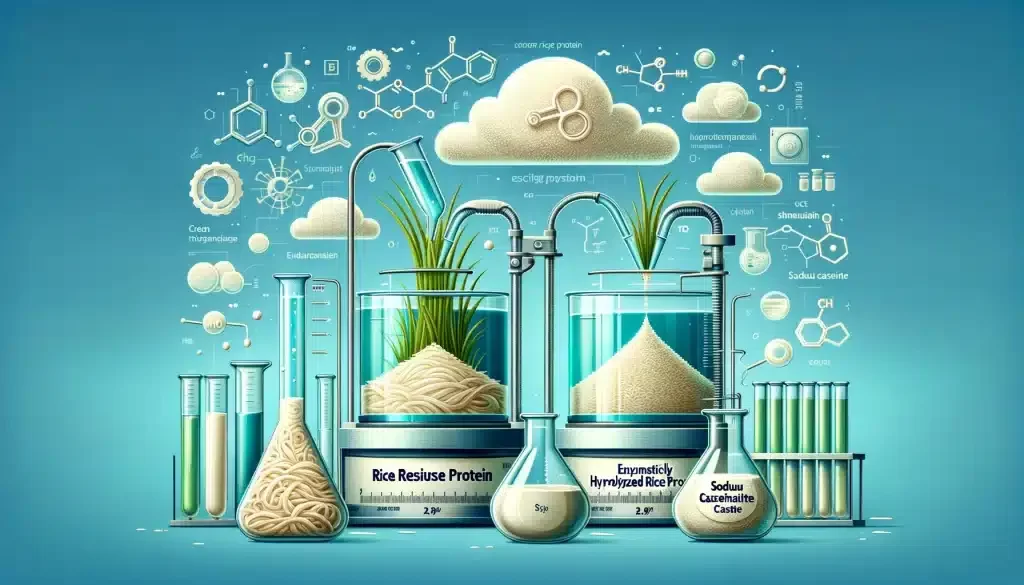Characterization Of Emulsifying Properties Of Limited Enzymatic Hydrolysis Of Rice Residue Protein
Exploring rice residue protein’s enhanced emulsifying properties through enzymatic hydrolysis, comparing it with sodium caseinate for sustainable industry applications
This article discusses the emulsifying activity, emulsification stability, and limited enzymatic hydrolysis of rice residue protein with degrees of hydrolysis (DH) of 3, 4, 5, 6, and 10 after hydrolysis by alkaline endoprotease Alcalase 2.4L FG. Solubility, surface tension, viscosity, sample emulsion particle size distribution and other characteristics were compared with rice residue protein, rice protein isolate, and foreign imported sodium caseinate. The results showed that the emulsification functional properties of limited enzymatic hydrolysis of rice residue protein were greatly superior. It is based on rice protein isolate and rice residue protein, and the emulsification property of limited enzymatic hydrolysis of rice residue protein (DH=4) is better than that of imported sodium caseinate, but the emulsification stability is inferior to sodium caseinate. The comprehensive results show that, The limited enzymatic hydrolysis of rice residue protein with DH=4 has good emulsifying properties.
Introduction to Plant-based Emulsifiers and Study Overview
Emulsification processes are critical in various industries, especially food, pharmaceuticals, and cosmetics, where the mixture of immiscible liquids forms a significant part of product formulation. In the quest for sustainable and high-performing emulsifiers, recent research has turned towards plant-based proteins, with rice residue protein emerging as a particularly promising candidate. This article provides an in-depth analysis of a study focused on the emulsifying activity, emulsification stability, and the impact of limited enzymatic hydrolysis on rice residue protein.
Methodology: Enzymatic Hydrolysis of Rice Residue Protein
The study employed alkaline endoprotease Alcalase 2.4L FG to hydrolyze rice residue protein to degrees of hydrolysis (DH) of 3, 4, 5, 6, and 10. This process modifies the protein structure, potentially enhancing its functional properties, such as solubility, which in turn could improve its performance as an emulsifier. The research meticulously compared the modified rice residue proteins’ solubility, surface tension, viscosity, and emulsion particle size distribution with that of rice protein isolate and a widely used emulsifier in the food industry, imported sodium caseinate.
Comparative Analysis of Emulsifying Properties
The findings revealed a significant enhancement in the emulsifying functional properties of rice residue protein following limited enzymatic hydrolysis. Notably, the protein with a DH of 4 exhibited superior emulsification properties compared to both rice protein isolate and rice residue protein. This suggests that the enzymatic treatment not only breaks down the protein to more manageable sizes but also exposes hydrophobic and hydrophilic sites, improving the protein’s ability to interact with water and oil phases in an emulsion.
Superior Emulsification with Limited Enzymatic Hydrolysis
Comparatively, while the rice residue protein hydrolysate at DH=4 outperformed the emulsifying capabilities of imported sodium caseinate, it fell short in terms of emulsion stability. Sodium caseinate maintained its position as a more stable emulsifier over time, which is a critical factor in many applications requiring long shelf life and resistance to phase separation.
Stability Comparison with Sodium Caseinate
Despite this, the comprehensive results of the study underscore the potential of limited enzymatic hydrolysis of rice residue protein at a DH of 4 as a viable alternative to traditional animal-derived and synthetic emulsifiers. Its good emulsifying properties highlight the role of plant-based proteins in developing sustainable, efficient, and potentially allergen-free emulsifiers for various applications.
Potential of Hydrolyzed Rice Residue Protein as a Sustainable Emulsifier
This research not only contributes to the expanding field of green chemistry and sustainable materials but also opens up new avenues for the utilization of agricultural by-products. Rice residue, often considered a waste product, can thus be valorized into high-value ingredients for the food and beverage industry, among others. The implications of this study extend beyond the laboratory, offering practical solutions to industry challenges while aligning with the global push towards sustainability and reduced reliance on animal-derived ingredients.
In conclusion, the study presents a compelling case for the use of rice residue protein hydrolysates as effective emulsifiers. The specific enhancement of emulsifying properties at a DH of 4 after enzymatic treatment with Alcalase 2.4L FG highlights a promising avenue for further research and application development. This paves the way for the broader adoption of plant-based proteins as functional ingredients in emulsion-based products, contributing to the sustainability and innovation within the food science and technology sectors.
For futher details of this article and research, feel free to contact our team for assistance.
About ETprotein:
ETprotein, a reputable plant protein vegan protein Chinese factory manufacturer and supplier, is renowned for producing, stocking, exporting, and delivering the highest quality organic bulk vegan protein and plant proteins. They include Organic rice protein, clear rice protein, pea protein, clear pea protein, oat protein, watermelon seed protein, pumpkin seed protein, sunflower seed protein, mung bean protein, peanut protein, various of plant peptides etc. Their offerings, characterized by a neutral taste, non-GMO, allergen-free attributes, cater to a diverse range of industries. They serve nutraceutical, pharmaceutical, cosmeceutical, veterinary, as well as food and beverage finished product distributors, traders, and manufacturers across Europe, USA, Canada, Australia, Thailand, Japan, Korea, Brazil, and Chile, among others.
ETprotein specialization includes exporting and delivering tailor-made protein powder and finished nutritional supplements. Their extensive product range covers sectors like Food and Beverage, Sports Nutrition, Weight Management, Dietary Supplements, Health and Wellness Products, and Infant Formula, ensuring comprehensive solutions to meet all your protein needs.
As a trusted company by leading global food and beverage brands and Fortune 500 companies, ETprotein reinforces China’s reputation in the global arena. For more information or to get a free sample of their protein products, please contact them and email sales(at)ETprotein.com today.














